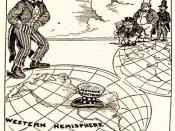A number of additions to the foreign policy of the United States of America not only increased the tension between the US and the world. Among these additions are the Monroe Doctrine, the Roosevelt Corollary to the Monroe Doctrine, and the Truman Doctrine. Each one was added to defend and represent the interests of the United States of America. While doing so, those additions also "raised questions about the United States' role in the World."
The first of these came the Monroe Doctrine. During the years of Imperialism and European expansion certain colonized Latin American nations would rebel and regain their independence. While having their independence they were still far from securing it. In order to keep European expansion out of Latin America and to protect the interests of the American people, on December 2,1823, President James Monroe gave his annual message to the Congress, which became known as the Monroe Doctrine.
He stated that the US would not interfere with any existing colonies, but would consider any nation that attempted to colonize any Latin American Nation that have declared their independence a threat to the peace and safety to America. Thus they would consider "any interference on the part of the European powers as an attack on [America]." The question raised by this was if America had the right to interfere in the affairs of Latin American Nations?
The next came as an addition to the Monroe Doctrine made by Theodore Roosevelt. It became known as the "Roosevelt Corollary to the Monroe Doctrine." In the late 1800's the wealth of Raw materials and potential consumers in the Latin America's attracted a large number of American and European capital. Most of these were in the form of large bank loans. Latin Americas' welcomed the loans but...


